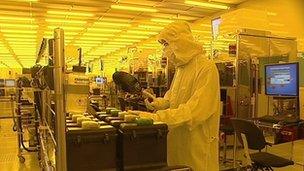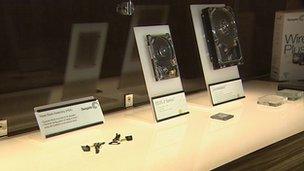Seagate Londonderry: behind the white walls
- Published

Since opening in 1993, the hard drive manufacturer has become Derry's largest employer,
It all started out as a friendly chat over a pint and ended with a hundreds of millions of pounds cash injection for Northern Ireland.
When the SDLP's John Hume met Seagate executive Brendan Hegarty in a Los Angeles bar, the investment that resulted transformed the lives of thousands of people in Londonderry.
Seagate celebrates its 20th anniversary in the city this year.
Since opening in 1993, the hard drive manufacturer has become Derry's largest employer, with a staff of almost 1,400.
The Springtown factory makes a tiny specialised part for hard drives called a recording head.
Twenty five per cent of the world's recording heads are produced from the Springtown plant.
The company has invested £722m in equipment, land and buildings.
Richard Gamble, director of equipment at Springtown, said he thinks few people realise the state-of-the art nature of what goes on there "behind the white walls".
"The technology we're talking about here is at the nano scale, which is one-thousandth of a millionth of a metre," he said.
"The analogy that we use to explain the read/write head that we make is: it's as if a recording head was a jumbo jet flying across a football pitch at cruising speed; but one inch above it and counting every blade of grass - that's how we compare what the head is effectively doing.
"It is really cutting edge technology. To put it in context, we're one of only six plants in the world that make this type of technology."
Phillip Gilliland, president of Londonderry Chamber of Commerce, said the £46m the firm pays in wages locally every year is "absolutely crucial".
"But it's not just about the wages they are putting into the economy, it's the ambassadorial role Seagate plays when Derry is out there in the world trying to attract other investment and the mentoring role that Seagate plays to local business," he said.
"When you're trying to sell a place for inward investors, your merits get you to a shortlist but then you have to find something typically subjective to clinch it for you."
Mr Gilliland pointed to the example of the Republic of Ireland's IDA (Industrial Development Agency) who often brought American investors to All-Ireland hurling finals in the 1990s to differentiate Ireland from other places.
"Well the Seagate story is that after the famous meeting with John Hume, the then chairman Al Shugart sent over the now chairman Steve Luczo to do a recce on Derry," he said.
"Steve went back and said 'yep it's good, it deserves to be on our shortlist'. Al jumped in and said 'okay we'll do it' and Steve said 'well, that was very quick, of course we'll do it. But can I just ask you why your mind was made up so quickly?' and Al said 'because it's the right thing to do'.
'Dedicated'
Dr Brian Burns is vice-president of the Seagate plant in Derry.
"Al was a great guy, he really did think a lot about people and once we'd made that decision there were a lot of other things that brought us to the north west," he said.
"We have a very strong education system here, really good access to technically trained people. We got excellent support from the government - you can't underestimate the part they played with Invest NI."

Twenty five per cent of the world's recording heads are produced from the Springtown plant.
Dr Burns said Seagate still works very closely with Invest NI and has expanded from manufacturing into research and development.
"We're a very valued part of the supply chain, not only from a manufacturing perspective but we are now very heavily involved in development of the recording heads that we make," he said.
"We've invested heavily in development and we now take products through from design, preproduction through development and into large scale manufacturing."
"People are a huge part of why Seagate have stayed here, we invest heavily in people. Our people are hard working, dedicated, very innovative, they come up with some great solutions.
"Over the years you develop a lot of knowledge and that knowledge is very, very important when you're dealing with the kind of technology we do and the knowledge base we have at Springtown is very, very important to Seagate as a whole."
Seagate's success means people with advanced STEM qualifications like Rosin Monaghan have not had to move overseas to find a high-tech job.
"I really never, ever thought I'd get a job like this in Derry," she said.
"There's very little manufacturing work here, so the opportunities for an engineer aren't great - there are only smaller companies, so this was a great opportunity for me."
'Colossal'
While those employed at the plant in Springtown appear to be weathering the ongoing global economic storm, workers in Limavady were not so lucky.
The Seagate plant there closed its doors back in 2008 leaving more than 1,000 people without a job. It was a devastating blow for the workers and the town of Limavady. Heather and Tommy Doherty from Magilligan first met in the plant and later tied the knot.
Tommy was one of the original members of staff who was sent to Seagate plants in America for initial training before we returning to Limavady to a brand new factory.
"Some people have been lucky enough to find work, but I don't think people realised at that time how much Seagate meant to Limavady," he said.
Heather said that, even though she was working for an international company, it was "a family atmosphere".
Current Vice President Dr Burns was working at the Limavady factory at the time.
"It was a very difficult day knowing people that were there and the consequences of the decision," he said.
"I do want to make sure people understand it wasn't about the performance of the plant or quality, it was purely a business decision and it really came down to the economics at the time and the Limavady plant wasn't economically viable."
Professor Gerry Murray of the Ulster Business School said the amount of wages paid into the local economy by the company in the last 20 years is "colossal".
"And the amount of spin-off to local companies has been very, very great as well and you can ally to that the amount of companies that set up not on the back of Seagate, but had a comfort factor that Seagate was already here," he said.
"Many government agencies are saying you can't get a large inward investment operation like a Seagate the way the current economic climate is.
"It is important to say, hold on folks we've been there, bought the t-shirt: we have a large company employing 1,300. They've been here for 20 years, they're quite happy to stay, we have a wide range of skills, a wide range of research, R&D technology etc so the fact that they are here makes it easier to sell this region to other potential inward investors."
- Published16 May 2013